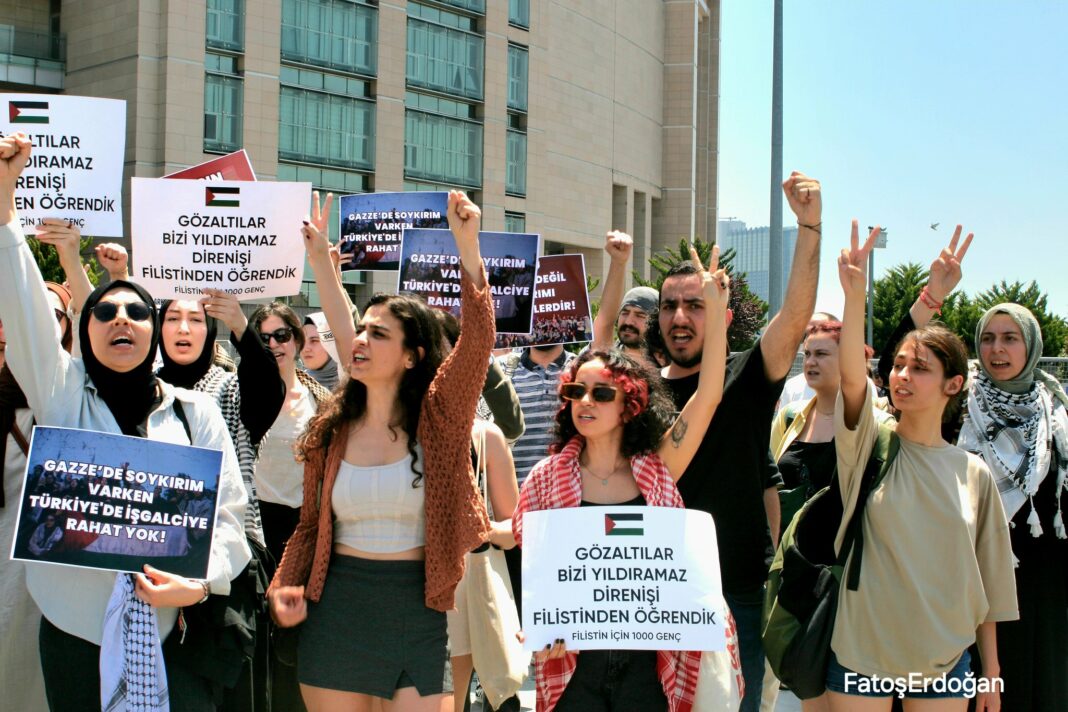Turkish authorities have detained 13 members of a pro-Palestine group following a demonstration in which they accused Azerbaijani energy company SOCAR as well as the Turkish government of “complicity in Israel’s genocide in Palestine,” local media reported over the weekend.
One of the 13 detainees was referred to court on Monday as the prosecutor sought his arrest, while the other 12 were released under judicial supervision, according to local media reports.
The group, called “A Thousand Youths for Palestine,” on Friday stormed the İstanbul office of the state-owned company and covered the building in red paint to symbolize blood. They accused Baku and Ankara of “fueling Israel’s genocide in Palestine” through the Baku-Tbilisi-Ceyhan (BTC) pipeline, which supplies around 40 percent of Israel’s annual crude oil consumption.
“As Israel commits genocide in Palestine for nine months, Azerbaijan and Turkey are complicit by transporting millions of barrels of oil to fuel this genocide. We will continue to voice our protest and will not allow this bloody trade to continue,” the protesters announced on X.
REFAHI BOMBALAYAN JETLERİN PETROLÜNÜ SAĞLAYAN SOCARDAN FİLİSTİN HALKI ADINA HESAP SORMAYA GELDİK! 🇵🇸 İNTİFADA SESİNİ BU TOPRAKLARA TAŞIYACAĞIZ DEMİŞTİK, SÖZÜMÜZÜ TUTTUK ✌🏾 pic.twitter.com/qCWplnZ2lt
— Filistin İçin Bin Genç (@filistinicinbin) May 31, 2024
Speaking to the Serbestiyet news website on Sunday, Hüseyin Arif Sarıyaşar, a representative from the pro-Palestine group, said 13 of his friends were detained in morning raids for protesting in front of the SOCAR office, while detention warrants were issued for 16 protestors in total. The group also said on X that some of their female members were subjected to strip-searches following their detention and that all members detained following the SOCAR protest are charged with damage to property and unauthorized entry into someone’s residence or workplace.
SOCAR'IN SOYKIRIMCI İSRAİL'E VARİL VARİL PETROL TAŞIDIĞINI İFŞA EDEN KADIN ARKADAŞLARIMIZ ÇIPLAK ARAMAYA MARUZ BIRAKILDI!#suçisrailleişbirliğidir pic.twitter.com/FD5UDuSoUM
— Filistin İçin Bin Genç (@filistinicinbin) June 2, 2024
Meanwhile, a report on Haber Global TV, financed by Anar Aliyev, a SOCAR executive close to the family of Azerbaijani President Ilham Aliyev, accused the pro-Palestinian group of collaborating with terrorist organizations and Iranian-backed groups. It described the SOCAR protest as a provocation targeting Turkish President Recep Tayyip Erdoğan’s brotherhood with Aliyev.“These attempts, like the previous ones, will surely fail,” the report said.
VİDEO HABER | Haber Global SOCAR protestosu hakkında "Terör iltisaklı, İran bağlantılı, Ermeni çeteleri yendiğimiz gibi yeneceğiz" ifadelerini kullandı.
🇦🇿 Haber Global TV'yi Aliyev ailesine yakın SOCAR yöneticisi Anar Aliyev finanse ediyor pic.twitter.com/bnxvQiBDht
— serbestiyet (@serbestiyetweb) June 2, 2024
A Thousand Youths for Palestine also gathered in front of the İstanbul Courthouse in Çağlayan on Monday to protest the detention of their fellow protestors. They said, citing lawyers, that the detainees were not given any food or water between Sunday night and 2:00 p.m. on Monday. They held banners reading, “Our pro-Palestinian cause cannot be judged,” “Close the valves [of oil], don’t be a partner in crime” and “Detentions will not deter us, we learned resistance from Palestine.”
Avukatlarımızdan öğrendiğimize göre, dün evleri basılarak gözaltına alınan arkadaşlarımıza dün akşamdan bugün 14.00'e kadar hiç su ve yemek verilmemiş.
Bizi yıldırmaya çalışanlar iyi bilsin, Filistin özgür olana dek mücadeleden vazgeçmiyoruz! 🇵🇸 pic.twitter.com/Pt4bA4Mmte
— Filistin İçin Bin Genç (@filistinicinbin) June 3, 2024
Another pro-Palestine group called “Direniş Çadırı” (Resistance Tent) expressed support for A Thousand Youths for Palestine, announcing on X that they are organizing a march in the capital of Ankara to make a press statement condemning the detention of the 13 protestors.
Filistin'in dostları değil Filistin halkının katili Socar şafak baskınını hak ediyor!
Arkadaşlarımızın gözaltılarını kabul etmiyoruz!
Basın Açıklaması için Ankara'da yürüyoruz!
🗓️ Bugün (03 Haziran) 19:30
📍Yüksel Caddesinden (İnsanlık Anıtı) Sakarya Caddesine. pic.twitter.com/JzVGfzple6— Direniş Çadırı (@direniscadiri) June 3, 2024
SOCAR, a state-owned company, has been under scrutiny for its involvement in the BTC pipeline, which transports Azerbaijani crude oil through Turkey to the Mediterranean port of Ceyhan. From there, the oil is shipped to various destinations, including Israel.
Investigative journalist Metin Cihan highlighted that the BTC pipeline, operated by British Petroleum (BP), supplies around 40 percent of Israel’s annual crude oil consumption. Cihan criticized the terms of the BTC agreement, which obligates Turkey to maintain the oil flow even during conflict, prioritizing oil trade over human rights and national sovereignty.
Despite Turkey’s public condemnation of Israel’s military actions in Gaza and a recent halt to bilateral trade, the BTC pipeline continues to operate.
The binding agreements from 1999 mandate its operation regardless of regional developments. Experts and rights groups have criticized the agreements as “colonialist” for granting BP privileges and imposing obligations on the signatory states, requiring them to relinquish part of their sovereignty to ensure the pipeline’s operation.
The ongoing humanitarian crisis in Gaza has intensified scrutiny of Turkey’s trade practices with Israel. Erdoğan’s government recently restricted exports to Israel, but revelations of continued trade have sparked criticism and raised questions about Turkey’s support for Israel.
Israel’s military campaign in Gaza, which began on October 7 following an unprecedented attack by Hamas, has led to significant casualties and devastation. Turkey, a vocal critic of Israel’s actions, has accused the Israeli government of committing war crimes and genocide in Gaza.
